

Bloomsbury Collections - The Digital Scholar - How Technology Is Transforming Scholarly Practice. A Framework for the Ethics of Open Education. AOIR (2012).
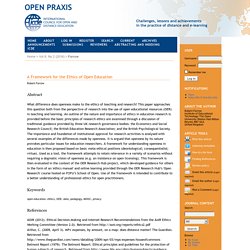
Ethical Decision-Making and Internet Research Recommendations from the AoIR Ethics Working Committee (Version 2.0). Retrieved from Arthur, C. (2009, April 3). MPs' expenses, by amount, on a map: does distance matter? The Guardian. Belmont Report (1979). BERA (2014). BPS (2010). MOOCs and Open Education Timeline (updated!) This revised version of the evolution of MOOCs was developed for our paper ‘Partnership Model for Entrepreneurial Innovation in Open Online’ now published in eLearning Papers.
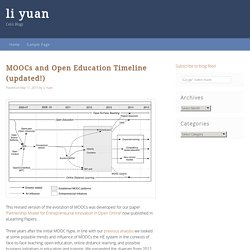
Three years after the initial MOOC hype, in line with our previous analysis we looked at some possible trends and influence of MOOCs the HE system in the contexts of face-to-face teaching, open education, online distance learning, and possible business initiatives in education and training. We expanded the diagram from 2012 -2015 and explored some key ideas and trends around the following aspects: Open license: Most MOOC content is not openly licensed so it cannot be reused in different contexts. There are, however, a few examples of institutions using Creative Commons licences for their courses – meaning they can be taken and re-used elsewhere.
OpenCases: catalogue of mini cases on open education in Europe. Perspectives on open and distance learning: Open Educational Resources: Innovation, research and practice. Open Educational Resources (OER) – that is, teaching, learning and research materials that their owners make free to others to use, revise and share – offer a powerful means of expanding the reach and effectiveness of worldwide education.
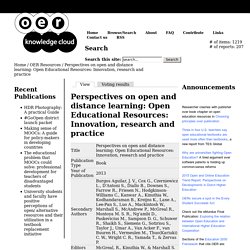
Opening up Education: A Support Framework for Higher Education Institutions. Opencontent. Defining the "Open" in Open Content and Open Educational Resources The terms "open content" and "open educational resources" describe any copyrightable work (traditionally excluding software, which is described by other terms like "open source") that is either (1) in the public domain or (2) licensed in a manner that provides everyone with free and perpetual permission to engage in the 5R activities: Legal Requirements and RestrictionsMake Open Content and OER Less Open.
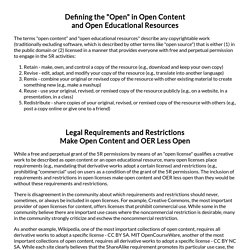
Ubiquity Press. The Battle for Open: How Openness Won and Why it Doesn’t Feel Like Victory, by Martin Weller Sandra Leaton Gray As an academic living through the rapid and sometimes brutal commoditisation of universities, there are days when I secretly feel a sense of foreboding, as though I’m some sort of well-meaning druid about to be slaughtered by the Romans.
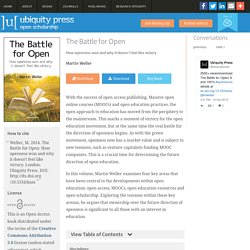
Beware, therefore, if you are of a nervous disposition and about to launch into reading this book. It may make you want to pull the duvet over your head and never get up again, once the stark future of academic publishing is laid out in front of you on your Kindle (if you can manage to download it, of course, which I struggled with). Martin Weller’s book is written in a beguilingly approachable style, reminiscent of 101 position papers and blog posts aimed at thrashing out the role of the modern university within contemporary society. On the role of openness in education: A historical reconstruction. Altbach, P. (1999).
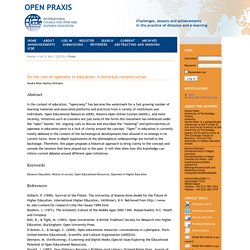
Survival of the Fittest. The University of Buenos Aires Model for the Future of Higher Education. Open innovation, open science, open to the world - Research policy and organisation. Publication details This book brings together some of the key conceptual insights behind Open Innovation, Open Science and Open to the World and highlights actions that are already taking place or are being prepared Corporate author(s): European Commission, Directorate-General for Research and Innovation Themes:
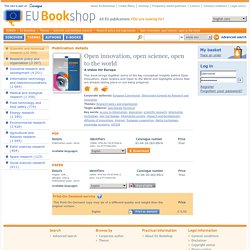
Critical analysis of scholarly open-access publishing. Assumptions and challenges of open scholarship. George Veletsianos and Royce Kimmons University of Texas at Austin, USA Abstract Researchers, educators, policymakers, and other education stakeholders hope and anticipate that openness and open scholarship will generate positive outcomes for education and scholarship.
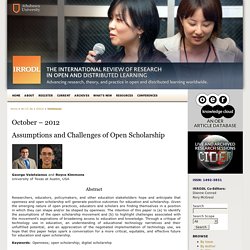
Given the emerging nature of open practices, educators and scholars are finding themselves in a position in which they can shape and/or be shaped by openness. Networked Participatory Scholarship: Emergent techno-cultural pressures toward open and digital scholarship in online networks. University of Texas at Austin, United States Received 9 July 2011, Revised 20 September 2011, Accepted 2 October 2011, Available online 7 October 2011 Choose an option to locate/access this article: Check if you have access through your login credentials or your institution Check access doi:10.1016/j.compedu.2011.10.001.
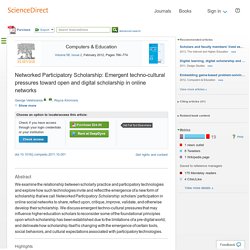
Online collaboration: Scientists and the social network. 06 Veletsianos 2010 Emerging Technologies in Distance Education. Openness, Dynamic Specialization, and the Disaggregated Future of Higher Education. David Wiley and John Hilton III Brigham Young University, USA Abstract Openness is a fundamental value underlying significant changes in society and is a prerequisite to changes institutions of higher education need to make in order to remain relevant to the society in which they exist.
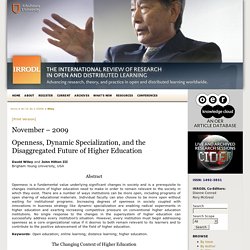
There are a number of ways institutions can be more open, including programs of open sharing of educational materials. Individual faculty can also choose to be more open without waiting for institutional programs. Making sense of open educational resources. Open educational resources are somewhat different from open learning, in that they are primarily content, while open learning includes both content and educational services, such as specially designed online materials, in-built learner support and assessment.Open educational resources cover a wide range of formats, including open textbooks, video recorded lectures, YouTube clips, web-based textual materials designed for independent study, animations and simulations, diagrams and graphics, some MOOCs, or even assessment materials such as tests with automated answers.
OER can also include Powerpoint slides or lecture notes. In order to be open educational resources, though, they must be freely available for at least educational use.For a useful overview of the research on OERs, see the Review Project from the Open Education Group.Principles of OERDavid Wiley is one of the pioneers of OER.
Once again, this aims to be a fairly descriptive account of OERs. Is it accurate and balanced? ICT4D Bibliography » Categories » Open Access. Works 171 references: Chan, L., Okune, A. & Sambuli, N. (Eds.) (2015). “What is open and collaborative science and what roles could it play in development?”. In Albagli, S., Maciel, M.L. & Abdo, A.H. What are open universities for?